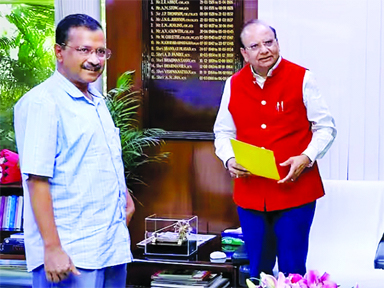New Delhi (TIP)– Stating that in a democracy, “the real power of administration must reside in the elected arm of the state”, the Supreme Court Thursday, May 11, held that the state government will have legislative and executive control over administrative services in the National Capital Territory of Delhi (NCTD) except with regard to public order, police and land.
The Supreme Court also sought to distinguish NCTD from other Union territories. “NCTD, having a sui generis federal model, must be allowed to function in the domain charted for it by the Constitution. The Union and NCTD share a unique federal relationship. It does not mean that NCTD is subsumed in the unit of the Union merely because it is not a ‘State’,” a five-judge Constitution bench chaired by Chief Justice of India DY Chandrachud said in a unanimous decision.
“The Legislative Assembly of NCTD has competence over entries in List II (state list) and List III (concurrent list) except for the expressly excluded entries of List II,” the Supreme Court said. The excluded entries are related to public order, police and land. Further, “the executive power of NCTD is co-extensive with its legislative power, that is, it shall extend to all matters with respect to which it has the power to legislate… The Lieutenant Governor shall be bound by the decisions of GNCTD on services”, it said.
List II or the State List contains subjects on which the state government can legislate. List III or the Concurrent List contains subjects on which Parliament and the state legislature have shared responsibility of making laws.
Disagreeing with the Centre which argued that the Constitution is a federal Constitution with a strong unitary bias as far as UTs are concerned, the Supreme Court said, it is not unitary. “The principles of democracy and federalism are essential features of our Constitution and form a part of the basic structure,” it said. Federalism “is a means to reconcile the desire of commonality along with the desire for autonomy and accommodate diverse needs in a pluralistic society”, said the judgement delivered by the CJI-led bench also comprising Justices M R Shah, Krishna Murari, Hima Kohli and P S Narasimha.
“Recognising regional aspirations strengthens the unity of the country and embodies the spirit of democracy. Thus, in any federal Constitution, at a minimum, there is a dual polity, that is, two sets of government operate: one at the level of the national government and the second at the level of the regional federal units. These dual sets of government, elected by ‘We the People’ in two separate electoral processes, is a dual manifestation of the public will. The priorities of these two sets of governments which manifest in a federal system are not just bound to be different, but are intended to be different,” the court said in its judgement.
The Supreme Court also made it clear that “NCTD has legislative and executive power over Services, that is, Entry 41 of List II of the Seventh Schedule…” Entry 41 of List II deals with state public services and the State Public Service Commission. The Centre had contended that NCTD does not have legislative competence over Entry 41 of List II on the ground that Part XIV of the Constitution which deals with “services under the Union and states” does not contemplate any services for Union Territories. The SC, however, said “There is nothing in the subject or context of Part XIV of the Constitution which would exclude its application to Union territories.”
While the Supreme Court said that the legislative and executive power of NCTD over Entry 41 shall not extend to services related to public order, police, and land, these powers would remain with NCTD over “services such as Indian Administrative Services, or joint cadre services, which are relevant for the implementation of policies and vision of NCTD in terms of day-to-day administration of the region shall lie with NCTD”. Source: Indian Express
Delhi unique among UTs: SC gives state govt total control over services in NCT

Delhi CM Arvind Kejriwal and Lt Governor VK Saxena.